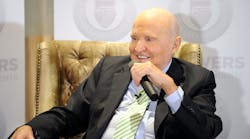This story is being updated to include new comments from sources.
Jack F. Welch, Ph.D. has died. News of the former GE CEO’s death was reported by CNBC on March 3, who received the news from Welch’s wife, Suzy. In a statement, GE CEO Lawrence Culp, Jr., said it was a “sad day for the entire GE family.” Welch was 84 years old.
Welch was famous for his legendary 20-year tenure as CEO of General Electric for which he received praise and accolades: in 2004, he was named IndustryWeek’s CEO of the Decade for the 1990s, and Fortune Magazine called him the best manager of the twentieth century.
In the article that named Welch—“Jack” to his employees—IW’s CEO of the 1990s, IndustryWeek's John McClenahen called Welch an “impatient, blunt, and driven chief executive who has crafted a high-performing, $100.5 billion conglomerate from 10 businesses ranging from aircraft engines, appliances, and broadcasting to capital services, lighting, and transportation systems.”
In a 1994 interview with IndustryWeek, Welch articulated his corporate strategy, saying, “Organizations constantly need to be regenerated.” Appropriately, Welch’s debut at GE was marked by radical reinvention: When he became CEO in 1981, Welch split GE’s holdings into two groups. The first group were companies that were first or second best in the country for their industries. The second group, Welch held, needed to improve, or they’d be sold or closed. “A successful leader can shock an organization and lead its recovery,” Welch said. “An unsuccessful leader will shock an organization and paralyze it.”
Welch also accelerated the adoption of Six Sigma quality control procedures after GE implemented the process in 1995. The lean-influenced system, which favors a data-driven improvement cycle for business processes and designs, achieved wider notoriety thanks to GE’s adoption and success under the system.
McClenahen noted that six U.S. executives who worked under Welch had gone on to helm other multibillion-dollar companies—but noted that several felt they had to leave GE in order to achieve their potential. He quoted Norman P. Blake, who went on to helm USF&G, a Baltimore-based insurance holding company, as saying that he “would never fully answer” the question of his own potential as long as he remained at GE.
Steven Blue, CEO of Miller Ingenuity and author of Metamorphosis: From Rust-Belt to High-Tech in a 21st Century World, said in an email that one of Welch’s top contributions to corporate leadership was his Crontonville leadership campus. “Indoctrinating and training the entire leadership in ‘Jack’s way’ was central to the initial transformation of GE culture,” Blue wrote. But he faulted Welch for encouraging a competitive, rather than collaborative, model of leadership. Some would disagree. In McClenahen’s article naming Welch CEO of the decade, Welch's close friend Lawrence A. Bossidy said he was distinguished by “his strong focus on people, which is constant, relentless, and effective.”
Larry Fast, founder and president of Pathways to Manufacturing Excellence, wrote that Welch had a "profound impact on many manufacturing leaders." "He was one of a kind," he said in an email. Fast credited Welch for teaching him to set and communicate a clear corporate vision, to surround himself with "'A' players," part ways with "'C' players," and to "reward superior performance," among other lessons. "He was always stretching the boundaries of what was possible," Fast wrote. David Cote, former CEO of Honeywell and current executive chair of Vertiv Holdings, described Welch as "a force of nature" who "was emulated by many and admired by many more."
And in an emailed comment, former GE CEO Jeff Immelt praised his predecessor, whom he succeeded in 2001: "From the first day I joined GE, I felt like I worked for Jack Welch, and that was all right by me. He was a brilliant, aspirational leader." Addressing Welch's manner, Immelt wrote, "Jack was always direct, but his frankness was appealing and effective. His informality and accessibility made GE a team—we all loved working for him because he wanted the people around him to succeed. Jack was the best boss I ever had. God bless him and his family.”




